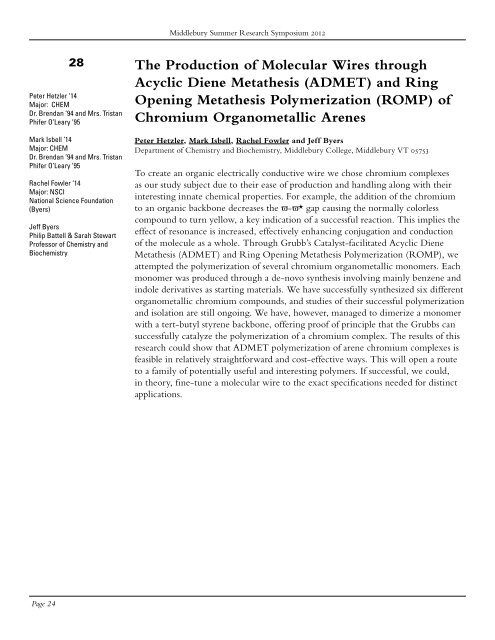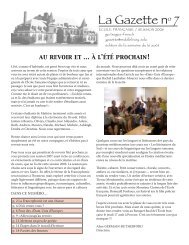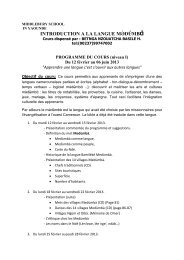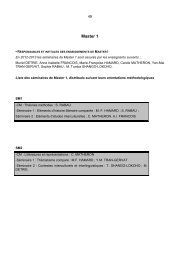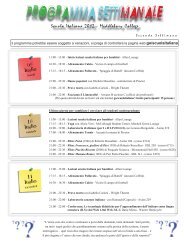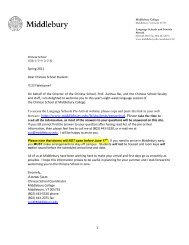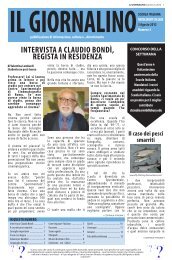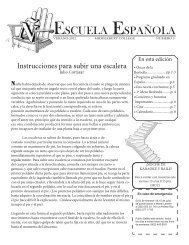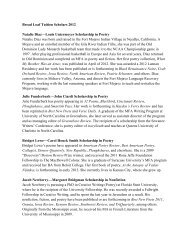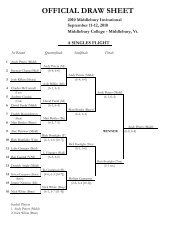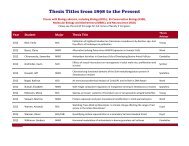2012 Summer Symposium Program - Middlebury College
2012 Summer Symposium Program - Middlebury College
2012 Summer Symposium Program - Middlebury College
Create successful ePaper yourself
Turn your PDF publications into a flip-book with our unique Google optimized e-Paper software.
Page 24<br />
28<br />
Peter Hetzler ‘14<br />
Major: CHEM<br />
Dr. Brendan ’94 and Mrs. Tristan<br />
Phifer O’Leary ’95<br />
Mark Isbell ‘14<br />
Major: CHEM<br />
Dr. Brendan ’94 and Mrs. Tristan<br />
Phifer O’Leary ’95<br />
Rachel Fowler ‘14<br />
Major: NSCI<br />
National Science Foundation<br />
(Byers)<br />
Jeff Byers<br />
Philip Battell & Sarah Stewart<br />
Professor of Chemistry and<br />
Biochemistry<br />
<strong>Middlebury</strong> <strong>Summer</strong> Research <strong>Symposium</strong> <strong>2012</strong><br />
The Production of Molecular Wires through<br />
Acyclic Diene Metathesis (ADMET) and Ring<br />
Opening Metathesis Polymerization (ROMP) of<br />
Chromium Organometallic Arenes<br />
Peter Hetzler, Mark Isbell, Rachel Fowler and Jeff Byers<br />
Department of Chemistry and Biochemistry, <strong>Middlebury</strong> <strong>College</strong>, <strong>Middlebury</strong> VT 05753<br />
To create an organic electrically conductive wire we chose chromium complexes<br />
as our study subject due to their ease of production and handling along with their<br />
interesting innate chemical properties. For example, the addition of the chromium<br />
to an organic backbone decreases the π-π* gap causing the normally colorless<br />
compound to turn yellow, a key indication of a successful reaction. This implies the<br />
effect of resonance is increased, effectively enhancing conjugation and conduction<br />
of the molecule as a whole. Through Grubb’s Catalyst-facilitated Acyclic Diene<br />
Metathesis (ADMET) and Ring Opening Metathesis Polymerization (ROMP), we<br />
attempted the polymerization of several chromium organometallic monomers. Each<br />
monomer was produced through a de-novo synthesis involving mainly benzene and<br />
indole derivatives as starting materials. We have successfully synthesized six different<br />
organometallic chromium compounds, and studies of their successful polymerization<br />
and isolation are still ongoing. We have, however, managed to dimerize a monomer<br />
with a tert-butyl styrene backbone, offering proof of principle that the Grubbs can<br />
successfully catalyze the polymerization of a chromium complex. The results of this<br />
research could show that ADMET polymerization of arene chromium complexes is<br />
feasible in relatively straightforward and cost-effective ways. This will open a route<br />
to a family of potentially useful and interesting polymers. If successful, we could,<br />
in theory, fine-tune a molecular wire to the exact specifications needed for distinct<br />
applications.


